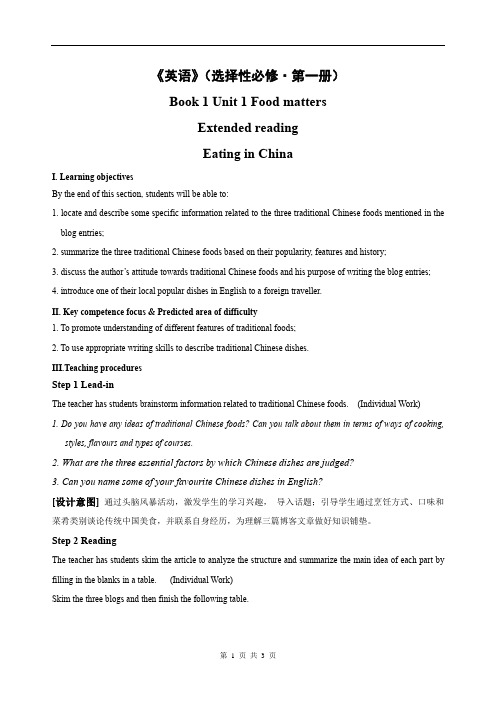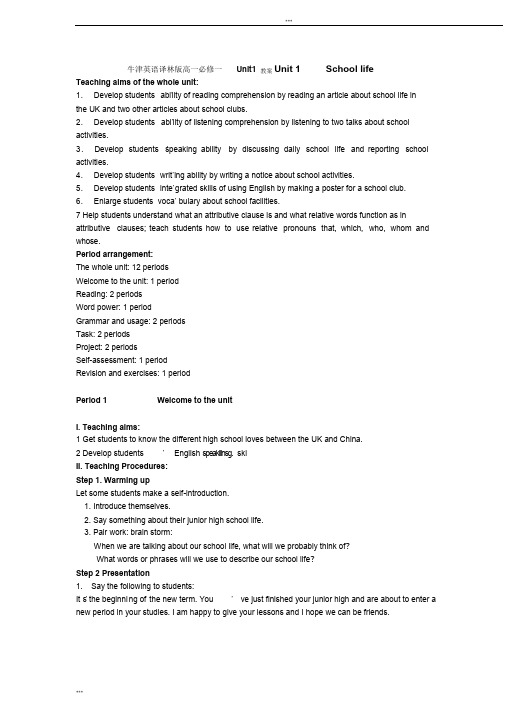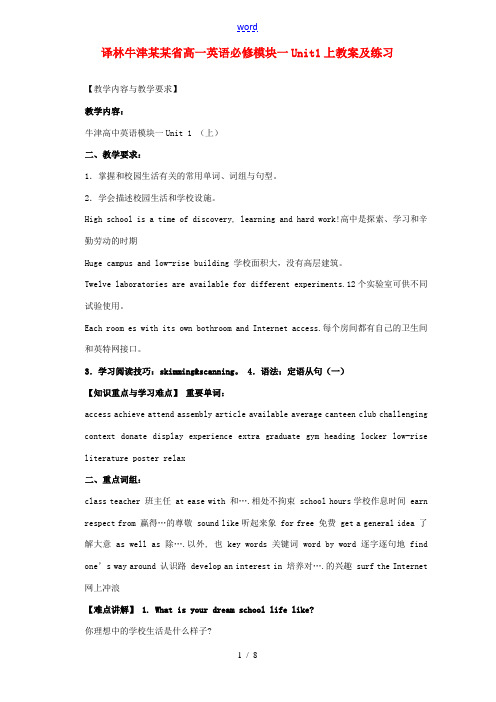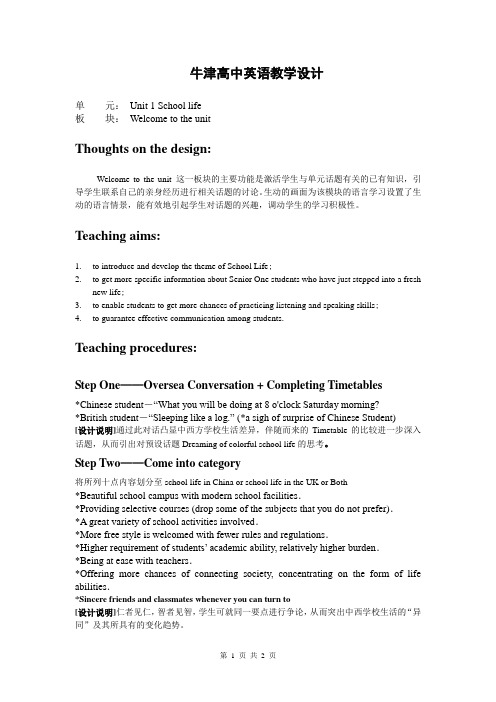牛津高中英语牛津版译林版高一模块一Unit1教案
2021牛津译林版高中英语必修一 Unit1 Extended reading教学设计

《英语》(选择性必修·第一册)Book 1 Unit 1 Food mattersExtended readingEating in ChinaI. Learning objectivesBy the end of this section, students will be able to:1. locate and describe some specific information related to the three traditional Chinese foods mentioned in the blog entries;2. summarize the three traditional Chinese foods based on their popularity, features and history;3. discuss the author’s attitude towards traditional Chinese foods and his purpose of writing the blog entries;4. introduce one of their local popular dishes in English to a foreign traveller.II. Key competence focus & Predicted area of difficulty1. To promote understanding of different features of traditional foods;2. To use appropriate writing skills to describe traditional Chinese dishes.III.Teaching proceduresStep 1 Lead-inThe teacher has students brainstorm information related to traditional Chinese foods. (Individual Work)1. Do you have any ideas of traditional Chinese foods? Can you talk about them in terms of ways of cooking,styles, flavours and types of courses.2. What are the three essential factors by which Chinese dishes are judged?3. Can you name some of your favourite Chinese dishes in English?[设计意图] 通过头脑风暴活动,激发学生的学习兴趣,导入话题;引导学生通过烹饪方式、口味和菜肴类别谈论传统中国美食,并联系自身经历,为理解三篇博客文章做好知识铺垫。
牛津高中英语牛津版译林版高一模块一Unit1教案

牛津英语译林版高一必修一Unit1 教案Unit 1 School lifeTeaching aims of the whole unit:1.Develop students abi’l ity of reading comprehension by reading an article about school life inthe UK and two other articles about school clubs.2.Develop students abi’lity of listening comprehension by listening to two talks about school activities.3.Develop students s’peaking ability by discussing daily school life and reporting school activities.4.Develop students writ’ing ability by writing a notice about school activities.5.Develop students inte’grated skills of using English by making a poster for a school club. 6.Enlarge students voca’bulary about school facilities.7 Help students understand what an attributive clause is and what relative words function as in attributive clauses; teach students how to use relative pronouns that, which, who, whom and whose.Period arrangement:The whole unit: 12 periodsWelcome to the unit: 1 periodReading: 2 periodsWord power: 1 periodGrammar and usage: 2 periodsTask: 2 periodsProject: 2 periodsSelf-assessment: 1 periodRevision and exercises: 1 periodPeriod 1 Welcome to the unitI. Teaching aims:1 Get students to know the different high school loves between the UK and China.2 Develop students ’English spe ak lil n s g. skiII. Teaching Procedures:Step 1. Warming upLet some students make a self-introduction.1. Introduce themselves.2. Say something about their junior high school life.3. Pair work: brain storm:When we are talking about our school life, what will we probably think of?What words or phrases will we use to describe our school life?Step 2 Presentation1. Say the following to students:It s’the beginni ng of the new term. You ’ve just finished your junior high and are about to enter a new period in your studies. I am happy to give your lessons and I hope we can be friends.I can see that some of your are eager to know what studying at senior high will be like. Will it be differ4ent from junior high? Well, there are certainly many differences between junior high and senior high, but there are also some things that are the same in every school in China.What about schools in other countries? Do you have different experiences? Are schools all overthe world the same? This is the subject of our first unit.2. Ask students to read the instruction and tell them:Here are three pictures that show some aspects of school life in the UK. Please read the instructions, look at the pictures: what's the difference between schools in China and the UK?Step 3 Discussion1 Ask students the following questions to talk about the words in the four pictures:Huge campus and low-rise buildingsWhat does h uge mean?What does low-rise mean?What about campus and school buildings in China?(Schools in China usually have a large enough campus to make sure students have enough space to study and play. But most school buildings have at least 3 storeys.)Lockers for every studentDo you know what a locker is?(There are rows of lockers by the classrooms for students to put their bookd, exercise-books and other belongings.)What do you think about locker for students?Do you think that we should have such locker in our school? Why or Why not?Fewer students in each classHow many students are there in our class?Do you know the number of students in a class in the UK?At ease with our teacherWhat can we know from this picture?What does the word ease mean? What do you think the phrase at ease mean?Were you getting on well with the teacher when you were in junior high?What relationship do you want to have with your teachers in senior high?2 Ask students to work in groups to talk about the four pictures and the differences betweenschools in the UK and China. Then ask several students to report their discussion to the whole class.aspects In the UK In ChinaHuge campus and We can see huge campus Schools in China usually have a large enoughlow-rise buildings and low-rise buildings. campus to make sure students have enough space to It is the biggest difference study and play in.from schools in China But most school buildings are taller, at least threestoreys.Lockers for every There are rows of lockers Students bring what they need for lessons to school student by the classrooms for and then take it all back home after school. Most students to put their schools in china do not have equipment in thestationary, books, classroom.exercise-books and otherbelongings.Fewer students in There are fewer studentsThere are usually more students in high school, each class in a class, no more than perhaps 40 to 50 per class. Recently some schools30 per class. are beginning to limit the number of students ineach class.At ease with our Students have a close It is similar in china. Nowadays, lots of teachers and teacher relationship with their students have established a good relationship with teachers. They feel at easeeach other. They respect each other and work toand comfortable with gain a better understanding of each other.them.4. Ask students to discuss the three questions in pairs, and them ask some of them to report their answers to the questions to the whole class.What is your dream school life like?What kind of school activities do you enjoy?What do you think of your life here in the new school?Step 4 Summary and HomeworkToday we ’ve mainly talked about the differences between the high school lives in the UK and in China. After class you should:1) Recall all the new words and expressions that we learn in this lesson.2) Find more about any other differences between the high school lives in the UK and in China, either by surf the Internet or by reading some articles in newspapers or magazines.3) Preview the following part: reading (page 2 to page 4).。
【同课异构】高一英语(牛津译林版)必修一教案 unit1 School life welcome to the unit

Welcome to the unit 教案Step 1T: Welcome to our school.It’s the beginning of a new term. You have just finished junior high and are about to enter a new period in your studies. I am very happy to have all of you in my class and I hope we can be friends..I am your English teacher this year.First of all,allow me to introduce myself to you. My first name is Zong.So you can call me Mr Zong or Teacher Zong.I like playing computer, listening to music and reading in my free time.In a word, I like my job teaching very much.I do hope to have a good time with you.T: Just now I introduced myself to you.Now I want to ask some of you to introduce yourself to us.Any volunteers? What’s your name? S1: My name is... T: Do you have any hobbies? S2:I like ...T: Which school did you graduate from? S3:I came from No.1 Middle school.T:your name,please? S4:My name.....T:Which school are you from?S5:....active learningenjoy losing facerenew学习习惯1、课前预习课后复习不算作业,是一种习惯。
译林牛津江苏省高一英语必修模块一Unit1上教案及练习 牛津英语 教案

译林牛津某某省高一英语必修模块一Unit1上教案及练习【教学内容与教学要求】教学内容:牛津高中英语模块一Unit 1 (上)二、教学要求:1.掌握和校园生活有关的常用单词、词组与句型。
2.学会描述校园生活和学校设施。
High school is a time of discovery, learning and hard work!高中是探索、学习和辛勤劳动的时期Huge campus and low-rise building 学校面积大,没有高层建筑。
Twelve laboratories are available for different experiments.12个实验室可供不同试验使用。
Each room es with its own bothroom and Internet access.每个房间都有自己的卫生间和英特网接口。
3.学习阅读技巧:skimming&scanning。
4.语法:定语从句(一)【知识重点与学习难点】重要单词:access achieve attend assembly article available average canteen club challenging context donate display experience extra graduate gym heading locker low-rise literature poster relax二、重点词组:class teacher 班主任 at ease with 和….相处不拘束 school hours学校作息时间 earn respect from 赢得…的尊敬 sound like听起来象 for free 免费 get a general idea 了解大意 as well as 除….以外, 也 key words 关键词 word by word 逐字逐句地 find one’s way around 认识路 develop an interest in 培养对….的兴趣 surf the Internet 网上冲浪【难点讲解】 1. What is your dream school life like?你理想中的学校生活是什么样子?这里 dream 表示心目中最理想的. 如 dream team (梦之队)。
Unit1ExtendedreadingNewsthatMatters教案高中英语牛津译林版(202

3. Role play and find out the attitude of the third guest.
Archer’s opinion:
We have to achieve a balance between environmental
StepⅦ.Summary
教案
T: Lucid waters and lush mountains are invaluable assets. 绿水青山就是金山银山
1.Review the phrases in the blanks. 2.Ask students to retell what they have learned.
Protection mittee
StepⅣ. Careful reading
T:What attitudes may they take towards environmental protection? Read para3. and check your prediction. 1.Fill in the blanks to find out the attitude of the first guest.
主备人 班级 课题
教学 目标
教案
总第 节
陈晓琳
参与人
执教人
审
K2214
时间
核
人
News that Matters: pollution in Norgate
课 时
1
1.Most students know many key words and phrases and their relevant expressions after learning this passage.1.rapid development 快速发展;2.get rid of 摆脱;
牛津译林版(2020)高中英语选择性必修第一册Unit1教案

《英语》(选择性必修·第一册)Unit 1 Food mattersIntegrated skills (II)I. Learning objectivesBy the end of the lesson, students will be able to:1. talk about their favorite food, including its appearance, smell, taste, ways of cooking and a particular experience associated with it;2. write an article about their favorite food.II. Key competence focusWrite an article about their favorite food.III. Predicted area of difficulty1. How to convey the ideas clearly.2. How to write an article vividly.IV. Teaching proceduresStep 1 Lead-in1.T presents some pictures of food such as mooncake, Tiramisu, dumpling, hot pot, etc. and asks the following questions:Picture 1 (Mooncake)T: What can you see in the picture?S: Mooncakes.T: Have you tried a mooncake?S: Yes.T: When did you try it for the first time?S: I gave it my first try at the age of 5.T: Do you like it?S: Yes, very much.T: How does it taste?S: It tastes sweet.Picture 2 (Tiramisu)T: Do you know the dessert in the picture?S: It is Tiramisu.T: How does it look?S: It looks adorable.Picture 3 (Dumpling)T: What’s the picture about?S: Dumplings.T: Do you know how to cook the dish?S: It can be steamed, boiled or fried.Picture 4 (Hot pot)T: What’s it?S: It’s a hot pot.T: How do you think it feels in your mouth?S: I think it is spicy.2. T asks more questions as follows:T: What’s your favorite food? Why do you like it?(Ss may give various answers.)3. T shows a picture of salted duck and mentions her experience of tasting it for the first time.T: Salted duck is one of my personal favorites. I gave it my first try twenty years ago, together with my family members. My father went on a business trip to Nanjing and brought one back. Itlooked mouth-watering. Before my mother sliced it, brother and I couldn’t wait to have a try. The meat was juicy and salty, which really impressed all of us. How can I forget such a tasty dish?【设计意图:通过互动,引入主题,并为对话环节做铺垫。
牛津译林版英语必修一Unit1Welcometotheunit教案

牛津高中英语教学设计单元:Unit 1 School life板块:Welcome to the unitThoughts on the design:Welcome to the unit 这一板块的主要功能是激活学生与单元话题有关的已有知识,引导学生联系自己的亲身经历进行相关话题的讨论。
生动的画面为该模块的语言学习设置了生动的语言情景,能有效地引起学生对话题的兴趣,调动学生的学习积极性。
Teaching aims:1.to introduce and develop the theme of School Life;2.to get more specific information about Senior One students who have just stepped into a freshnew life;3.to enable students to get more chances of practicing listening and speaking skills;4.to guarantee effective communication among students.Teaching procedures:Step One——Oversea Conversation + Completing Timetables*Chinese student-“What you will be doing at 8 o'clock Saturday morning?*British student-“Sleeping like a log.” (*a sigh of surprise of Chinese Student)[设计说明]通过此对话凸显中西方学校生活差异,伴随而来的Timetable的比较进一步深入话题,从而引出对预设话题Dreaming of colorful school life的思考。
牛津译林版英语必修一Unit1Reading2教案

牛津高中英语教学设计单元:Unit1 School life板块:Reading (Language focus)教学设计指导思想:本课按照“点、线、面—单词、词组、句型”设计,课本主要词汇attend,drop,miss,experience通过幻灯片重点讲解, average, earn, challenging, extra, for free, used to 等以填空的形式呈现,相关短语教师口头陈述,学生举例运用。
最后学习动名词作主语并初步了解定语从句。
用所学词汇编故事。
Teaching aims:1.to learn the use of some important words and phrases;2.to get some idea about attributive clause and gerund as subject;3.to organize important words and phrases into paragraph.Step1 RevisionInterview: Suppose you have a chance to interview Wei Hua …Apart from the things you have been told, what other information would you like to know about her life and study in the UK.Ask her as many questions as possible.Step2 Language focusShowing some pictures (including attending class/school, attend a church, attend assembly, attend a wedding) to indicate “attend”.1. On the first day, all the students went to attend assembly.(1) vt.出席,参加(2) attend (on) sb. 照料某人,看护某人attend to sb.(3) attend to sth. 注意,专心干(某事)Exercises concerning “attend”.Distinguish the following four notions: “attend, join, join in, take part in”1) He _______ the army in the year of 2003.2) How many of you will ____________ the coming sports meeting?3) Who is going to ____________ the concert with me tomorrow?4) W on’t you ________ us ______ the tennis match?2. Students at that school have to study Math, English and Science, but can drop some subjects if they don’t like them. drop v. 放弃,落下,断绝(往来),减少,降低Try to tell the meaning of “drops”in the following sentences.1) It was so quiet that you could hear a pin drop.2) His voice dropped. / He dropped his voice to a whisper.3) Please drop me at the Post Office.4) It is wise of you to drop the habit of smoking. _______Drop n.滴;点; 下降;落下;下跌a drop of water 一滴水eye drops 眼药水teardrops 泪珠 a drop in the price of wheat小麦价格下跌e.g.1.The worldwide economic recession has led to ___________in people’s salary. (下降)2. I didn’t see any _________ on Liu Xiang’s face when he quit running in the Olympic GamesV ocabulary extensiondrop in / by顺便拜访drop sb. a line 写封短信drop in on sb. 造访某人drop in at a place造访某地1) The headmaster asked me to_________ him at his office. 校长让我去他办公室。
- 1、下载文档前请自行甄别文档内容的完整性,平台不提供额外的编辑、内容补充、找答案等附加服务。
- 2、"仅部分预览"的文档,不可在线预览部分如存在完整性等问题,可反馈申请退款(可完整预览的文档不适用该条件!)。
- 3、如文档侵犯您的权益,请联系客服反馈,我们会尽快为您处理(人工客服工作时间:9:00-18:30)。
牛津英语译林版高一必修一Unit1 教案Unit 1School lifeTeaching aims of the whole unit:1. Develop students ability’ of reading comprehension by reading an article about school lifein the UK and two other articles about school clubs.2. Develop students ability’ of listening comprehension by listening to two talks aboutschool activities.3. Develop students speaking’ ability by discussing daily school life and reporting school activities.4. Develop students writing’ ability by writing a notice about school activities.5. Develop students integrated’ skills of using English by making a poster for a school club. 6. Enlarge students vocabulary’ about school facilities.7 Help students understand what an attributive clause is and what relative words function as in attributive clauses; teach students how to use relative pronouns that, which, who, whom and whose.Period arrangement:The whole unit: 12 periodsWelcome to the unit: 1 periodReading: 2 periodsWord power: 1 periodGrammar and usage: 2 periodsTask: 2 periodsProject: 2 periodsSelf-assessment: 1 periodRevision and exercises: 1 periodPeriod 1Welcome to the unitI. Teaching aims:1 Get students to know the different high school loves between the UK and China.2 Develop students ’ English speakinglls. skiII. Teaching Procedures:Step 1. Warming upLet some students make a self-introduction.1. Introduce themselves.2. Say something about their junior high school life.3. Pair work: brain storm:When we are talking about our school life, what will we probably think of?What words or phrases will we use to describe our school life?Step 2 Presentation1. Say the following to students:It s’the beginni ng of the new term. You ’ ve just finished your junior high and are about to enter a new period in your studies. I am happy to give your lessons and I hope we can be friends.I can see that some of your are eager to know what studying at senior high will be like. Will it be differ4ent from junior high? Well, there are certainly many differences between junior high and senior high, but there are also some things that are the same in every school in China.What about schools in other countries? Do you have different experiences? Are schools allover the world the same? This is the subject of our first unit.2. Ask students to read the instruction and tell them:Here are three pictures that show some aspects of school life in the UK. Please read the instructions, look at the pictures: what's the difference between schools in China and the UK?Step 3 Discussion1 Ask students the following questions to talk about the words in the four pictures:Huge campus and low-rise buildingsWhat does huge mean?What does low-rise mean?What about campus and school buildings in China?(Schools in China usually have a large enough campus to make sure students have enough space to study and play. But most school buildings have at least 3 storeys.)Lockers for every studentDo you know what a locker is?(There are rows of lockers by the classrooms for students to put their bookd, exercise-booksand other belongings.)What do you think about locker for students?Do you think that we should have such locker in our school? Why or Why not?Fewer students in each classHow many students are there in our class?Do you know the number of students in a class in the UK?At ease with our teacherWhat can we know from this picture?What does the word ease mean? What do you think the phrase at ease mean?Were you getting on well with the teacher when you were in junior high?What relationship do you want to have with your teachers in senior high?2 Ask students to work in groups to talk about the four pictures and the differences between schools in the UK and China. Then ask several students to report their discussion to thewhole class.aspects In the UK In ChinaHuge campus and We can see huge campus Schools in China usually have a large enoughlow-rise buildings and low-rise buildings. campus to make sure students have enough space to It is the biggest difference study and play in.from schools in China But most school buildings are taller, at least threestoreys.Lockers for every There are rows of lockers Students bring what they need for lessons to school student by the classrooms for and then take it all back home after school. Most students to put their schools in china do not have equipment in theFewer students in each class stationary, books,classroom.exercise-books and otherbelongings.There are fewer students There are usually more students in high school, in a class, no more than perhaps 40 to 50 per class. Recently some schools 30 per class.are beginning to limit the number of students ineach class.At ease with our Students have a close It is similar in china. Nowadays, lots of teachers and teacher relationship with their students have established a good relationship with teachers. They feel at ease each other. They respect each other and work toand comfortable with gain a better understanding of each other.them.3. Ask students to discuss the three questions in pairs, and them ask some of them to report their answers to the questions to the whole class.What is your dream school life like?What kind of school activities do you enjoy?What do you think of your life here in the new school?Step 4 Summary and HomeworkToday we ’ ve mainly talked about the differences between the high school lives in the UK and in China. After class you should:1) Recall all the new words and expressions that we learn in this lesson.2) Find more about any other differences between the high school lives in the UK and in China, either by surf the Internet or by reading some articles in newspapers or magazines.3) Preview the following part: reading (page 2 to page 4).4)。
